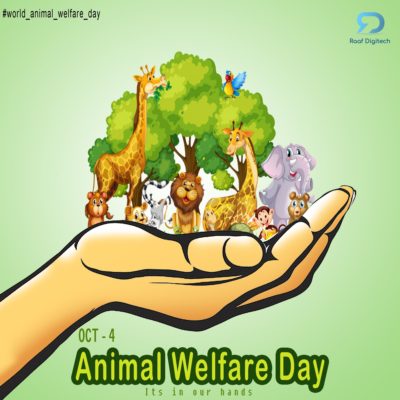 World Animal Welfare Day is celebrated on 4th October across the world to raise awareness about improving the welfare standards of the animals across the world and also to celebrate the relationship between humankind and animal kingdom. World Animal Welfare Day was first started in 1931 at a convention of ecologists in Florence, Italy, to highlight the importance of endangered species. It is also known as “Animal Lovers Day.”
World Animal Welfare Day is celebrated on 4th October across the world to raise awareness about improving the welfare standards of the animals across the world and also to celebrate the relationship between humankind and animal kingdom. World Animal Welfare Day was first started in 1931 at a convention of ecologists in Florence, Italy, to highlight the importance of endangered species. It is also known as “Animal Lovers Day.”
Climate change impacts both humans and animals, and the deforestation of rainforests is a significant contributing factor. One of the most detrimental deforestation practices is caused by the harvesting of palm oil, which is found in 40% to 50% of the household products in the United States. One of the species most impacted by this trend is the orangutan; more than 90% of its habitat has been destroyed over the last two decades. Other animals that are suffering due to global climate change include many endangered and threatened species, including polar bears, rhinos, elephants and tigers.
Prevention of animals:
- Learn about endangered species in your area.
- Visit a national wildlife refuge, park or other open space
- Make your home wildlife friendly.
- Native plants provide food and shelter for native wildlife
- Herbicides and pesticides may keep yards looking nice but they are in fact hazardous pollutants that affect wildlife at many levels.
- Slow down when driving.
- Recycle and buy sustainable products.
- Never purchase products made from threatened or endangered species
- Harassing wildlife is cruel and illegal.
- Protect wildlife habitat.
- Eat less (or no) meat.
Facts of animals:
- A cow’s “moo” has a different accent depending on what region they originate from
- Bats always turn left when they fly out of a cave
- Zebras are actually white with black stripes
- Flamingoes can eat only when their heads are upside down
- A duck’s “quack” never echoes, anywhere, and nobody knows why
- The fingerprints of a koala are so indistinguishable from humans that they have on occasion been confused at a crime scene.
- Elephants are the only animal that can’t jump.
- A Rhino’s horn is made of hair
- It is possible to hypnotize a frog by placing it on its back and gently stroking its stomach.
- It takes a sloth two weeks to digest its food.
- Nearly three percent of the ice in Antarctic glaciers is penguin urine.
- Giraffes have no vocal chords.
- An ostrich’s eye is bigger than its brain.
- Around 50 percent of orangutans have fractured bones, due to falling out of trees on a regular basis.
- Frogs cannot vomit. If one absolutely has to, then it will vomit its entire stomach.
- Parrots will selflessly help each other out
- Female lions do 90 percent of the hunting
- The world’s oldest known breed of domesticated dog dates back to 329 BC
- And the oldest evidence of domesticated cats dates back 9,500 years.
- Bottlenose dolphins are even more right-handed than humans.
- Capuchin monkeys wash their hands and feet in urine.
- A grizzly bear’s bite is strong enough to crush a bowling ball.
- Ducks can surf.
- Zebra stripes act as a natural bug repellant.
- Octopuses can taste with their arms.
- Dolphins have names for one another.
- Reindeer eyes turn blue in the winter.
- Adult cats only meow at humans.
- Otters have the world’s thickest fur.
- Snow leopards don’t roar.
- Squirrels will adopt orphans.
- Deer can run up to 35 miles per hour.
- Cats recognize their own name but choose not to respond.
- Giraffes with darker spots are more dominant.
- Horses have distinct facial expressions.

